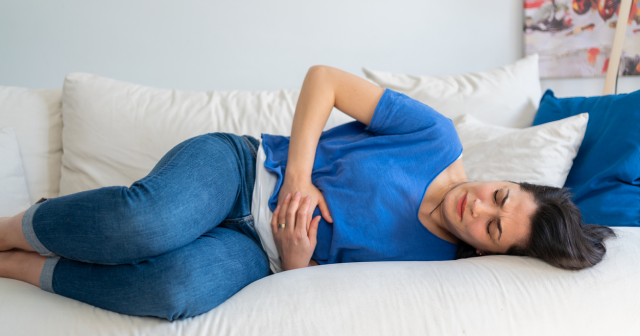Heart palpitations and the menopause
Up to 1 in 4 women experience significant palpitations during menopause, with many others having mild symptoms. Most cases of palpitations don’t require treatment and can be helped by lifestyle changes, but if they’re caused by the hormone changes of the menopause then hormone replacement therapy (HRT) can be helpful. Although often harmless, palpitations shouldn’t be ignored, so if you experience them speak to your doctor.
What do menopause palpitations feel like?
Unlike normal heartbeats, palpitations are heartbeats that you are aware of. Your heart may feel like it’s beating forcefully, quickly or irregularly. There may also be the sensation of a rapid fluttering or a ‘flip-flopping’ in your chest, or a pounding sensation in your chest or neck. These sensations can last for a few seconds or a few minutes but are usually harmless, and not a sign of a serious problem.
What are the causes of heart palpitations?
There are many possible causes of palpitations including exercise, emotion and stress. Palpitations – sometimes called irregular heartbeats or tachycardia (fast heart rate) – are also common in perimenopausal and menopausal women because of the changing levels of hormones (such as oestrogen) in the body that happen then. They’re often linked to hot flushes that occur during this time.

Heart palpitations in women can sometimes be triggered by the hormonal changes that happen during the perimenopause and menopause, during pregnancy or just before periods. These are usually temporary and not a cause for concern. Other causes of palpitations include:
- lifestyle factors that can cause palpitations, such as lack of sleep, drinking too much alcohol or caffeine, smoking, taking illegal recreational drugs, or strenuous exercise
- heart problems including heart failure, heart valve conditions and cardiomyopathy. There may also be problems with the rhythm of the heart such as atrial fibrillation or flutter, and supraventricular tachycardia
- emotional triggers of palpitations that include strong excitement, anxiety and nervousness, stress and panic attacks
- examples of medication that can trigger palpitations including asthma inhalers, antihistamines, antidepressants, antibiotics, and tablets used to treat high blood pressure
- medical conditions that can be linked to palpitations, like an overactive thyroid gland (hyperthyroidism), a low blood sugar level, anaemia, fever, and postural hypotension where dizziness, low blood pressure and palpitations are triggered by standing up from sitting or lying down
When to worry about heart palpitations
Call an ambulance or go to your local accident and emergency department if you have palpitations associated with:
- severe shortness of breath
- chest pain
- fainting or dizziness
- known significant heart problems
- a resting heart rate of more than 100 beats per minute or less than 45 beats per minute
See your doctor urgently if you:
- get palpitations that last a long time
- get palpitations that happen often, or are not going away
- have a family history of someone who died suddenly under the age of 40 years
- have been diagnosed with a heart condition
- get palpitations that are triggered by exercise
If you only experience palpitations very infrequently, for a short time, and they don’t cause you any problems or concerns, then you don’t usually need to see your doctor.
How can palpitations be stopped?
If your palpitations are linked to the hormone changes of the menopause, taking HRT can be very effective in reducing and preventing them. If you want to consider this treatment for your palpitations, make an appointment with your doctor to discuss this option. Depending on the cause, other things that may help include following a healthy lifestyle by reducing the amount of caffeine in your diet, avoiding stimulants like cigarettes and alcohol, and practising relaxation techniques like yoga and breathing exercises.
If you have palpitations due to other causes, their treatment depends on the cause. If you’ve a heart rhythm problem, treatment options include medication, cardioversion (an electrical treatment that ‘shocks’ the heart back into a normal rhythm), a pacemaker, or ablation treatment that destroys the area of heart tissue causing the arrhythmia. Treating the medical condition that is causing palpitations can stop them effectively and quickly.
Your health questions answered
Is the risk of heart disease increased during menopause?
 Answered by: Dr Roger Henderson
Answered by: Dr Roger HendersonYes. The hormone oestrogen offers some protection against coronary artery disease. It helps to control your cholesterol levels and so reduces the risk of fatty plaques building up inside the artery walls, reducing the risk of a heart attack. During and after the menopause, you gradually produce less oestrogen than previously, so this increases the risk of your coronary arteries narrowing – whereas it previously protected the lining of your artery walls. This increases your risk of developing heart disease, or a circulatory condition such as stroke.
Key takeaways
- palpitations are the sensation of rapid, irregular or forceful heart beats
they are often experienced during the perimenopause and menopause because of
the effect of altered hormone levels that occur at that time - they are usually harmless and require no treatment
- if treatment is required, lifestyle changes can be effective
- hormone replacement therapy (HRT) is an effective treatment for symptoms linked to the perimenopause and menopause, including palpitations.






